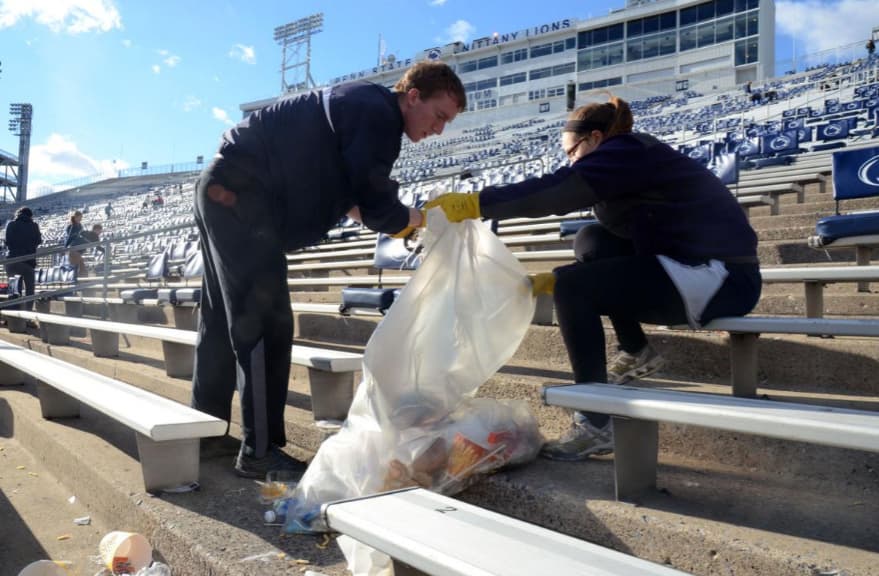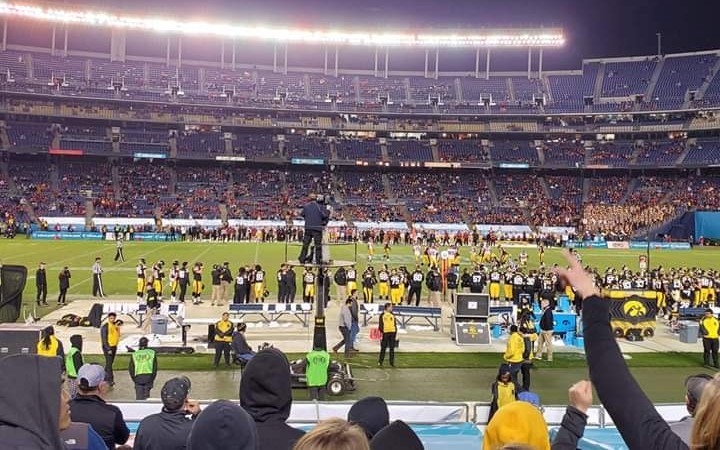As college football belches out yet another meaningless bowl spectacle, and the garbage pile bloats from a molehill into a mountain, interest in these games continues to plummet. Television ratings are in a steady decline. Games between mediocre teams take place in half-empty stadiums. Hardly anyone seems to care. Once and for all, it’s time to call out these corporate-sponsored shakedowns and label them for the exploitative scams they are. Let’s also acknowledge that if it weren’t for sports gamblers, almost no one would be watching.

On Thursday, Jan. 2nd, 2020, precisely at noon, college football’s mighty Boston College Eagles will take the field in a meaningless bowl game to be played in Birmingham, Alabama. More than half the seats in the cavernous 71,000-seat stadium will be empty. Television ratings will be somewhere on the level of an afternoon soap opera and a re-run of The Jerry Spring Show.
So — why is this travesty of a bowl game being played in the first place? Indeed, even the mere thought of Boston College getting invited to a bowl game is preposterous.
Presumably, bowl games are the reward for players, coaches, and fans after a hard-fought season that ended with some measure of success, you know, like say — achieving a winning record. However, the brain trust at Boston College was so disappointed with Steve Addazio’s job performance that they fired the head coach before the season ended. So, this mediocre football team with a head coach standing in the unemployment line, a team that went 6-6 in a wretched football conference, gets to play in the post-season. This is ludicrous. Unfortunately, Boston College isn’t the exception, but rather the rule.
They’re just one prime example in a smelly garbage bag stuffed with mediocre teams on full display in the NCAA’s corporate shakedown and money squeeze.
This holiday season (Dec. 20 through Jan. 13) no less than 40 bowl games are scheduled. Forty! Only a handful of these mass-produced matchups will mean anything — those which comprise the so-called “national championship” system. All the remaining games happen for no other reason than to squeeze one more unpaid performance from student-athletes so as to line the pockets of do-nothing bowl presidents, television networks, and the utterly despicable NCAA.
More “BS” Bowl Games
Here’s a test. Quick! Name the winner of last year’s “Dollar General Bowl.” No, I didn’t invent that name. Yes, there really is a bowl game named after a discount dollar store. How utterly appropriate: A college football game getting sponsored by a company that hawks stale candy and expired cans of soup. Spoiler Alert: Troy beat Buffalo 42-32, but I’m sure you already knew that.
Another bowl game this year is called the “Lending Tree Bowl.” Perfect! Just what college sports needs; a lending institution targeting a large percentage of attendees and viewers who end up getting crushed by student debt. But hey, might as well squeeze the kids for another 5 to 15 percent in interest. Seriously — it’s unfathomable this is happening. Basically, this is a third-party loansharking company with naming rights to a college football bowl game.
With the NCAA, everything’s for sale.
This year, bowl games will be played just about everywhere in America, from coast-to-coast, and beyond. From Yankee Stadium to Honolulu, from Nassau, Bahamas to Frisco, Texas. That’s right — Frisco. Not San Francisco, but Frisco, as in, “The Frisco Bowl.” I’m sure that’s every college football player’s dream — to be playing in a Dallas suburb on Christmas week in front of 11,029 fans (yes, that really was the attendance for the game played on Dec. 20th).
Although television ratings for 2019-2020 bowl games haven’t been announced yet, early forecasts don’t look good. TV ratings for seven of the nine conference championships (played in December 2019) declined from last year. Three declined by more than 20 percent. That’s not just a decline. That’s a disaster.
Last year’s bowl ratings tanked, also:Â Bowl Season Continues to Underwhelm in Ratings
When in Doubt, Just Follow the Money
Still not convinced most bowl games are a farce? Parsing over the 2019-2020 bowl schedule, I counted 13 bowl-bound teams that failed to achieve a winning season. All that’s required to be “bowl eligible” these days is a 6-6 record. Oh, and big and wealthy alumnus doesn’t hurt the chances of a bowl invite, either.
Some college football stars now recognize these games aren’t worth the tremendous risks they pose to body, careers, and future potential earnings. With essentially nothing to play for, many players opt to skip bowl games entirely for fear of injury. Seriously, why suit up? For what? Who can blame them?
These athletes get paid nothing. Millions in future earnings in the professional ranks are at stake. Why would any college football player with a realistic shot at the NFL draft risk a career-threatening injury?
Nonetheless, some individuals and entities are doing very well financially. Corporations pay big money for naming rights. Television companies fork over huge sums to broadcast the games. And, of course, there are ticket sales. Where does all the profit go?
Certainly, the NCAA skims off its share. All the fat-cat salaries of overpaid coaches, administrators, and staff get paid — including some who receive overtime. But the biggest blowhards of this legalized thievery are the bowl executives, many of whom receive (tax-free) compensation amounting to seven figures for what amounts to a few weeks worth of “work,” in addition to free, cushy box seats on the 50-yard line.
That’s right. Let’s look at it this way:
Outback Bowl Numbers (from 2018)
- Players Compensation: $550 each (in souvenirs/gift cards)
- The guy who “organizes” the bowl: $1,045,000
(Credit Matt Galambos on Twitter — @Galambos47)
Don’t believe this? Check out what these bowl presidents are getting paid, which now averages out to about $1 million for one game a year, which lasts about 3.5 hours.
Pissed off yet?
Gamblers Recycling College Football’s Giant Dumpster Bowl of Garbage
In light of all this institutionalized corruption, the exploitation of student-athletes, bloated bowl executives gaming the system, the laughable sports marketing campaigns of television networks desperately trying to make these uninspiring games somehow appear interesting, sports gamblers comprise the bedrock of viewer interest. In fact, gamblers are the saviors of the college football bowl system.
Based on the most recent television ratings available (from 2018), nearly two-thirds of all bowl games attract less than 3 million viewers nationwide. Half the bowl games draw between 1 and 2 million viewers. With sports gambling — legal, illegal, and offshore — now so widespread, and growing fast, it’s hardly a leap of logic to theorize that a substantial percentage of those watching have money riding on the outcome.
While there are no reliable data as to the actual percentages of bowl game viewers who are gamblers, I’m going out on a limb here to say a majority of those who tuned in to watch Georgia Southern beat Eastern Michigan 23-21 last year, probably had a financial interest in the game.
Multiply that scenario times a dozen, or perhaps two dozen. Most of these games were made for one thing — gambling.

Since we gamblers are essentially the audience that keep the college bowl season alive, certainly in terms of higher television-ratings wise, which generate profits and maintains the assembly line of games, it would sure be nice to be acknowledged as such. Or, at the very least, be given a little respect by the NCAA, which owes all of you reading this a huge “thank you.”
So, on your behalf let me just reply with, “You’re welcome.”
Statement of Fact: If it weren’t for gamblers and gambling, perhaps as many as half of these lousy bowl games wouldn’t even exist.












Completely agree. Love some bowl games.
About 13 of them.
Not 39….